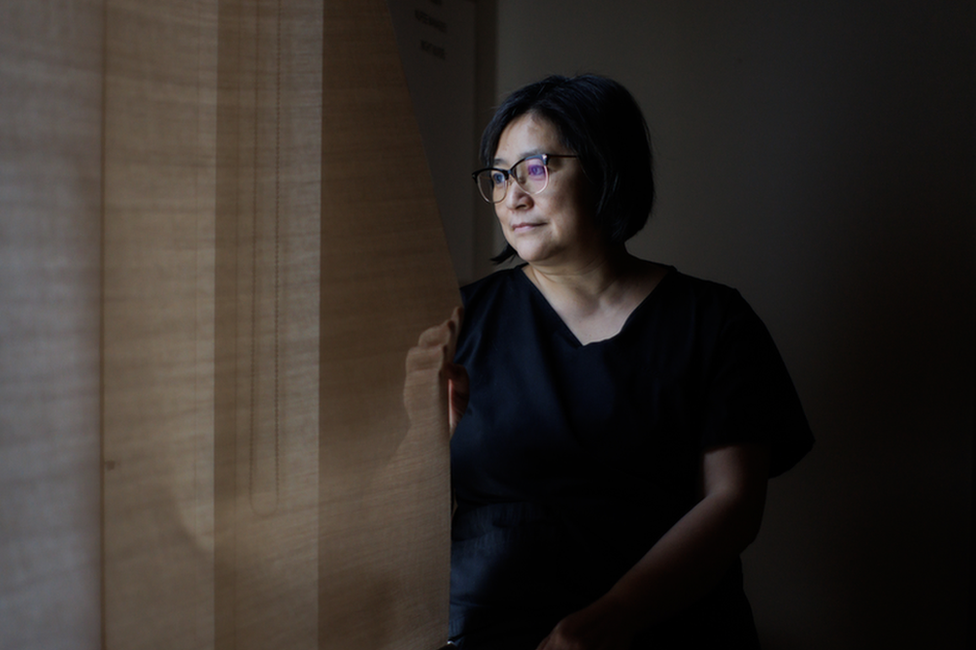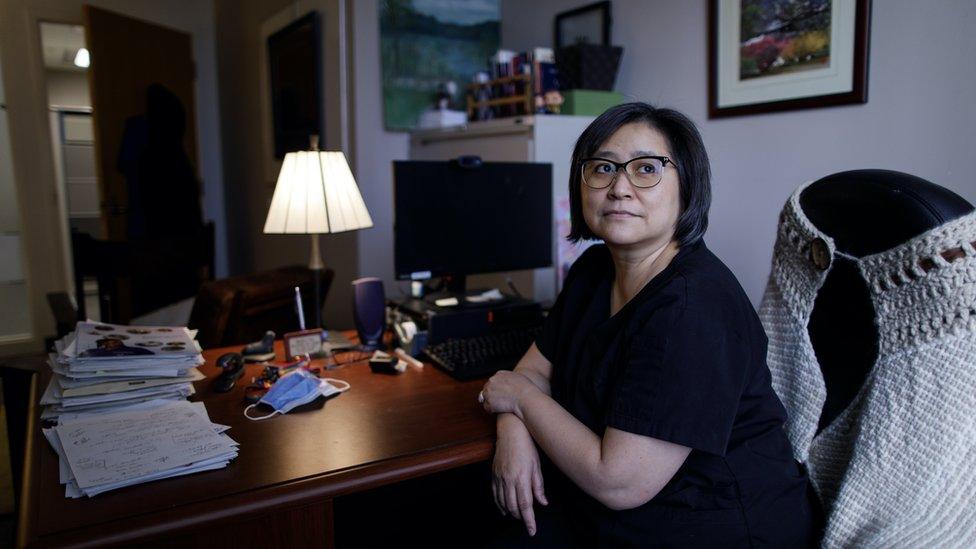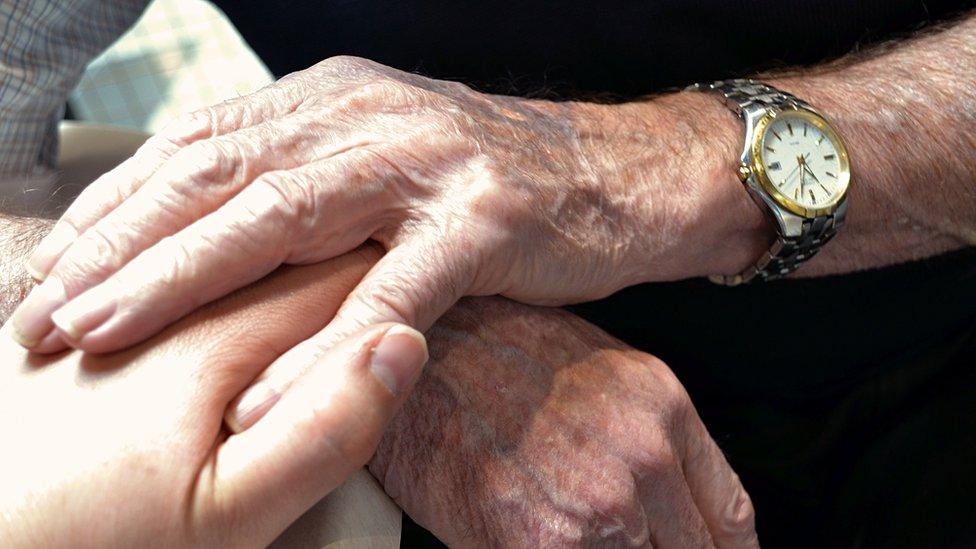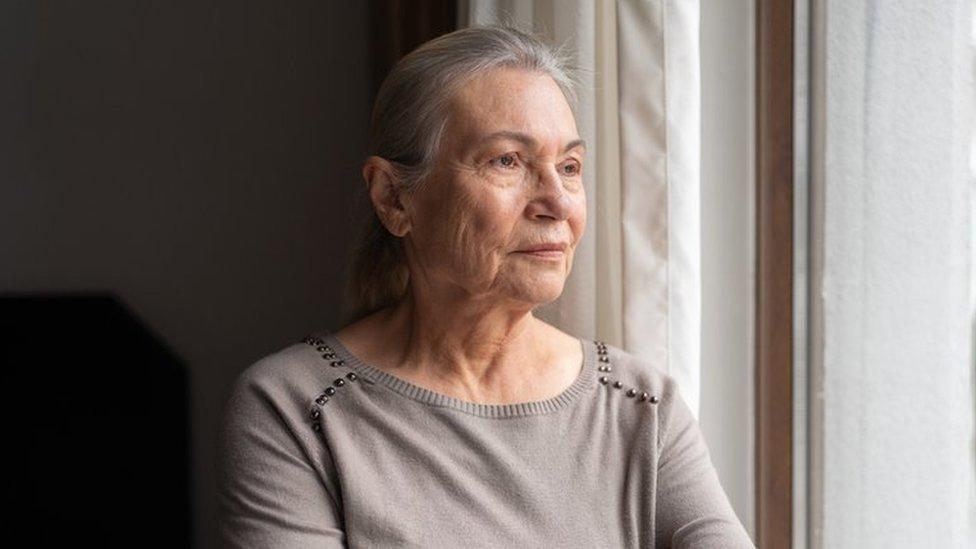Who can die? Canada wrestles with euthanasia for the mentally ill
- Published

Dr Madeline Li has helped hundreds of patients die. Now she has doubts about Canada's assisted dying programme.
As Canada prepares to expand its euthanasia law to include those with mental illness, some Canadians - including many of the country's doctors - question whether the country's assisted death programme has already moved too far, too fast.
Dr Madeline Li can recall the first patient she helped die, about one month after Canada first legalised euthanasia in 2016. "I remember just how surreal it was," she said.
A psychiatrist at Toronto's Princess Margaret Hospital, she recalled checking on her patient that day, asking if she had the right music and final meal, and if she was sure she wanted to go ahead. The patient, in her mid-60s and suffering from ovarian cancer, said she was.
Five minutes later, the woman was dead.
"It was like stepping off a cliff, that first one," Dr Li said. "Then time passes and it normalises."
She has since overseen hundreds of medically assisted dying cases.
Dr Li stressed repeatedly that a physician's personal opinions should not influence how they assess a patient for assisted death. But she has significant concerns about the expansion of Canada's euthanasia and assisted dying programme beyond the terminally ill. She is not alone.
Since 2016, Canada's medical assistance in dying programme - known by its acronym 'Maid' - has been available for adults with terminal illness. In 2021, the law was changed to include those with serious and chronic physical conditions, even if that condition was non-life threatening.
This year, it is expected to change again to include some Canadians with mental illness.
That planned expansion has ignited controversy over the assisted death programme as a whole and raised concerns that it may be too easy for the vulnerable to die in Canada. Those fears have been stoked by a recent string of reports suggesting that for some, death has been used as a stopgap for a broken social safety net.
"Making death too ready a solution disadvantages the most vulnerable people, and actually lets society off the hook," Dr Li said. "I don't think death should be society's solution for its own failures."

Princess Margaret Hospital in Toronto, where Dr Madeline Li works.
Medically assisted death arrived in Canada through the courts. In 2015, the country's Supreme Court ruled that banning assisted suicide deprived Canadians of their dignity and autonomy. It gave Parliament one year to draft legislation.
The 2016 law legalised assisted death for Canadians aged 18 and older with a serious and irreversible condition, whose death was "reasonably foreseeable".
In that first year, a little over 1,000 people received an assisted death, a number that has grown every year since. In 2021, the most recent figures available, there were 10,064 Maid cases, accounting for 3.3% of all deaths in Canada.
Opinion polls indicate Canadians broadly support access to at least some form of assisted suicide.
Death for the terminally ill can often be cruel and slow, physicians told the BBC, with the patient's final days spent slipping in and out of a drugged consciousness. The existence of assisted dying in these cases, doctors said, became a salve.
"Almost every single time I deem a patient eligible [for Maid], that patient stops worrying about how they're going to die and starts wondering how they're going to live," said Dr Stefanie Green, president of the Canadian Association of Maid Assessors and Providers.
"It is objectively therapeutic to give someone the option,"she said.
Canada's expansion to Maid last year followed another court decision after two people from Montreal with degenerative diseases launched a legal challenge.
The ruling put Canada in the company of just a handful of countries, including Belgium and the Netherlands, that allow medically assisted dying for those without a terminal illness.
The change included people whose sole medical condition was mental illness, but with a caveat: psychiatric Maid applications would be delayed for two years, while the federal government set up appropriate safeguards.
The looming expansion has attracted intense scrutiny and, for some, cast doubt on the country's assisted dying programme for the non-terminally ill.
Early critics of the programme include three United Nations human rights experts, who wrote to the federal government in 2021 warning that the expanded law could devalue the lives of disabled people by implying that a serious disability was worse than death.
A number of reports suggesting that some Canadians have opted for assisted death, at least in part because they could not afford adequate housing, have also prompted fears it could be used as a solution for societal challenges - that someone may seek out Maid because of poverty, lack of housing, or extreme loneliness.
"Leaving people to make this choice [to die] because the state is failing to fulfil their fundamental human rights is unacceptable," said Marie-Claud Landry, chief commissioner of the Canadian Human Rights Commission in a statement in May.
Others have pointed to what they describe as the programme's flimsy safeguards.
"The Maid law is very Canadian. It was left so vague it could offend nobody," Dr Li said.
The law, she said, "is not specific enough to protect people."
Should people with a mental illness be helped to die?
In 2019, 61-year-old Alan Nichols opted for an assisted death after he was admitted to a British Columbia hospital for suicide watch.
In the days before his death, he was agitated, confused, and refused to wear the cochlear implant that helped him hear, his sister-in-law Trish Nichols told a Senate committee last year. On his application for Maid, the stated reason was "hearing loss".
"Alan did not have a valid diagnosis for Maid," Mrs Nichols said. "Would you feel safe now, bringing your suicidal loved one to seek medical care for recovery when there are no oversight or stringent safeguards surrounding a procedure that kills people?"
Then last autumn, authorities launched an investigation after at least four veterans were prompted to consider Maid by a Veterans Affairs case worker, who now no longer works for the department. In one instance, veteran and paralympian Christine Gauthier said she was offered the option by the employee after she asked for a wheelchair ramp to be installed in her home.
The federal government says that the expanded law protects vulnerable Canadians while respecting patient autonomy. Applicants with grievous and incurable but non-life threatening conditions must be assessed by two separate clinicians and undergo a 90-day waiting period.
And proponents of assisted dying insist the existing guardrails are strong enough.
"I see the safeguards in place, I see them working," said Dr Green.
"I'm not naïve, I get it, lack of support in our community - disability support, income support, housing support - these things contribute to a person's suffering," she said. "But in and of itself, if that's what is motivating people to apply, they will not be found eligible."
Derryck Smith, a Vancouver psychiatrist and board member for Dying with Dignity, told the BBC that the standards ensure that only a small fraction of Canadians without terminal diagnoses would be eligible for Maid. "Look at the statistics," he said.
In 2021, the average age of a Maid recipient was 76. Eighty percent had received palliative care and 65% had cancer.

Dr Li has applauded Canada's decision to pause the Maid expansion for mental health.
But planned inclusion of mental health has prompted yet another set of concerns. Last month, facing mounting criticism, the Canadian government said it would seek to pause the inclusion of mental illness - scheduled for this March - to allow for additional study.
"We want to be prudent, we want to move in a step-by-step way, so we don't make mistakes," federal Justice Minister David Lametti said.
Much of the controversy is focused on the "irremediability" of a mental illness - meaning if it's incurable - and how that could be assessed. For a person to be eligible for Maid in Canada, their condition must be considered irremediable.
The Canadian Mental Health Association has warned it is "not possible" to determine whether any particular case of mental illness is incurable and strongly opposes the coming expansion. Some leading psychiatrists, like University of Toronto's Karandeep Sonu Gaind, have said the odds of predicting curability are worse than a coin flip.
It is now unclear when Canada's assisted dying law will be expanded to include mental illness. Mr Lametti did not say how long the extension would be, but there is no indication the pause is anything but temporary, as such a move would likely be deemed unconstitutional by the courts.
"We are listening to what we are hearing and being responsive," Mr Lametti said last month. "We know we need to get this right."
Dr Li has celebrated the government's decision to delay, saying healthcare providers may now have a chance to set up adequate safeguards.
"The time for debating 'should we do this' is over," she said. "What we need to start talking about is when and how we're going to do it right."


If you want to talk to someone about the issues raised in this piece, you can call the US Suicide and Crisis Lifeline on 988.
The BBC Action Line has links to organisations that can offer support and advice for people in the UK.
- Published24 February 2020

- Published9 December 2022

